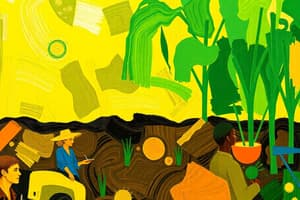Podcast
Questions and Answers
What is the primary focus of agronomy?
What is the primary focus of agronomy?
- Study of crops and soil (correct)
- Study of animal husbandry
- Study of agricultural machinery
- Study of urban gardening
Which of the following is a key concept in agronomy?
Which of the following is a key concept in agronomy?
- Soil Conservation
- Animal Nutrition
- Livestock Management
- Plant Breeding (correct)
What is Integrated Pest Management (IPM)?
What is Integrated Pest Management (IPM)?
- A form of organic farming only
- A method for increasing crop yield
- Only the use of chemical pesticides
- A strategy combining multiple pest control methods (correct)
Which practice is emphasized as sustainable in agriculture?
Which practice is emphasized as sustainable in agriculture?
What does precision agriculture utilize for farming decisions?
What does precision agriculture utilize for farming decisions?
How does climate impact agriculture?
How does climate impact agriculture?
What role does fertilization play in agronomy?
What role does fertilization play in agronomy?
What does the field of agricultural economics study?
What does the field of agricultural economics study?
Flashcards are hidden until you start studying
Study Notes
Definition of Agronomy
- Branch of agricultural science focused on the study of crops and the soil.
- Involves the application of various scientific disciplines to improve agricultural productivity.
Key Concepts
-
Crop Production
- Cultivation techniques, breeding, and management of crops.
- Focus on maximizing yield and quality.
-
Soil Science
- Understanding soil properties, classification, and fertility.
- Soil management practices to enhance crop growth.
-
Plant Breeding
- Genetic improvement of crop species for better yields and resistance to pests/diseases.
- Techniques include hybridization and genetic modification.
-
Pest Management
- Strategies for controlling agricultural pests and diseases.
- Integrated Pest Management (IPM) combines biological, cultural, physical, and chemical tools.
-
Sustainable Practices
- Emphasis on environmentally friendly farming methods.
- Techniques like crop rotation, cover cropping, and reduced tillage.
-
Irrigation and Water Management
- Efficient use of water resources in crop production.
- Types of irrigation systems: drip, sprinkler, and surface irrigation.
-
Fertilization
- Use of organic and synthetic fertilizers to enhance soil fertility.
- Importance of nutrient management for optimal crop growth.
-
Climate Influence
- Impact of climate and weather patterns on agriculture.
- Adaptation strategies for changing climatic conditions.
Modern Technologies in Agronomy
-
Precision Agriculture
- Use of technology for data-driven farming decisions.
- Involves GPS, drones, and sensors for monitoring crop conditions.
-
Biotechnology
- Application of biotech methods for crop enhancement.
- Development of genetically engineered crops for higher resilience.
Agricultural Economics
- Study of economic factors affecting agricultural practices.
- Markets, pricing, and the economic viability of crop production.
Importance of Agronomy
- Ensures food security through improved agricultural practices.
- Supports environmental stewardship and sustainable resource management.
- Contributes to rural development and economic growth.
Definition of Agronomy
- A branch of agricultural science that studies crops and soil.
- Integrates scientific disciplines to enhance agricultural productivity.
Key Concepts
-
Crop Production
- Involves cultivation techniques, breeding, and management for optimal yield and quality.
-
Soil Science
- Focuses on soil properties, classification, and fertility management to support crop growth.
-
Plant Breeding
- Aims to genetically improve crops for higher yields and pest/disease resistance.
- Employs techniques like hybridization and genetic modification.
-
Pest Management
- Develops strategies to control agricultural pests and diseases.
- Integrated Pest Management (IPM) combines biological, cultural, physical, and chemical methods.
-
Sustainable Practices
- Promotes environmentally friendly farming techniques.
- Includes crop rotation, cover cropping, and reduced tillage to maintain soil health.
-
Irrigation and Water Management
- Focuses on efficient water resource utilization in agriculture.
- Different irrigation systems include drip, sprinkler, and surface methods.
-
Fertilization
- Utilizes organic and synthetic fertilizers to improve soil fertility.
- Underlines the importance of proper nutrient management for crop productivity.
-
Climate Influence
- Examines how climate and weather patterns affect agriculture.
- Identifies adaptation strategies to cope with changing climatic conditions.
Modern Technologies in Agronomy
-
Precision Agriculture
- Leverages technology for data-driven decision-making in farming.
- Incorporates GPS, drones, and sensors to monitor crop health.
-
Biotechnology
- Applies biotech methods for crop enhancement.
- Focuses on developing genetically engineered crops to increase resilience to adverse conditions.
Agricultural Economics
- Analyzes economic factors that influence agricultural practices.
- Studies market dynamics, pricing, and the economic sustainability of crop production.
Importance of Agronomy
- Critical for ensuring food security through enhanced agricultural methodologies.
- Promotes environmental stewardship and responsible resource management.
- Supports rural development and drives economic growth in agricultural communities.
Studying That Suits You
Use AI to generate personalized quizzes and flashcards to suit your learning preferences.




